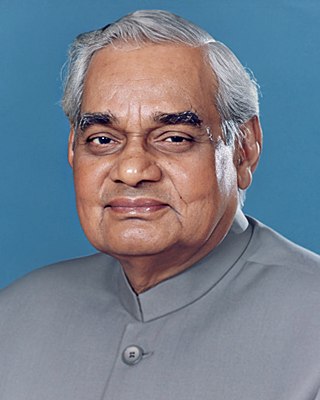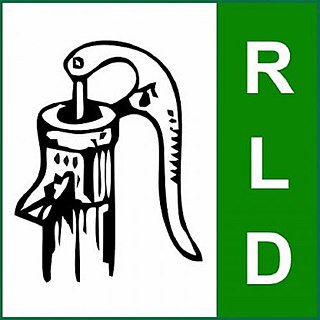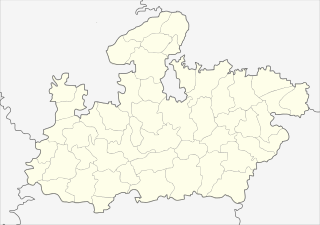Related Research Articles

Atal Bihari Vajpayee was an Indian politician and poet who served three terms as the 10th Prime Minister of India, first for a term of 13 days in 1996, then for a period of 13 months from 1998 to 1999, followed by a full term from 1999 to 2004. He was the first non-Indian National Congress prime minister to serve a full term in the office. Vajpayee was one of the co-founders and a senior leader of the Bharatiya Janata Party. He was a member of the RSS, a Hindu nationalist volunteer organisation. He was also a Hindi poet and a writer.

Uma Bharti is an Indian politician and former Chief Minister of Madhya Pradesh. She became involved with the Bharatiya Janata Party at a young age, unsuccessfully contesting her first parliamentary elections in 1984. In 1989, she successfully contested the Khajuraho seat, and retained it in elections conducted in 1991, 1996 and 1998. In 1999, she switched constituencies and won the Bhopal seat.
Events in the year 1998 in the Republic of India.
Events in the year 2003 in the Republic of India.
Events in the year 1996 in the Republic of India.

The Janata Party abbreviated JP, lit. People's Party) is an unrecognized political party in India. It was founded as an amalgam of Indian political parties opposed to the Emergency that was imposed between 1975 and 1977 by Prime Minister Indira Gandhi of the Indian National Congress. In the 1977 general election, the party defeated the Congress and Janata leader Morarji Desai became the first non-Congress prime minister in independent modern India's history.
Sikander Bakht was an Indian politician belonging to the Bharatiya Janata Party (BJP) who served as the 15th governor of Kerala from 2002 until his death. He was elected as the Vice President of the BJP, served as its leader in the Rajya Sabha, and as a cabinet minister in the NDA government headed by Atal Bihari Vajpayee. In 2000, he was awarded Padma Vibhushan, the second highest civilian honour of the Government of India.

Vindhya Pradesh was a former state of India. It occupied an area of 61,131.5 km2. It was created in 1948 as Union of Baghelkhand and Bundelkhand States, shortly after Indian independence, from the territories of the princely states in the eastern portion of the former Central India Agency. It was named as Vindhya Pradesh on 25 January 1950 after the Vindhya Range, which runs through the centre of the province. The capital of the state was the former princely state of Rewa. It lays between Uttar Pradesh to the north and Madhya Pradesh to the south, and the enclave of Datia, which lay a short distance to the west, was surrounded by the state of Madhya Bharat.

Rashtriya Lok Dal is an Indian regional political party in Uttar Pradesh and Rajasthan. It was founded by Chaudhary Ajit Singh, son of the former prime minister of India, Chaudhary Charan Singh in 1996 as a breakaway faction of the Janata Dal.
Varmā, Verma, Varman, or Burman are surnames found in India and Southeast Asia. These surnames are commonly used by people of different castes and ethnic groups across the region. The surname is used in North India by some of the groups among cluster of castes called Kayasthas. However, in the same region along with Central India, it can also be found among castes like Lodhi rajputs, Prajapats, Kurmis and Koeris.

Bansagar or Ban Sagar Dam is a multipurpose river Valley Project on Sone River situated in the Ganges Basin in Madhya Pradesh, India with both irrigation and 435 MW of hydroelectric power generation.
Karuna Shukla was a member of the 14th Lok Sabha of India.
Bhumihar, also locally called Bhuinhar and Babhan, is a Hindu caste mainly found in Bihar, the Purvanchal region of Uttar Pradesh, Jharkhand, the Bundelkhand region of Madhya Pradesh, and Nepal.
Gwalior Lok Sabha seat is one of the 29 Lok Sabha constituencies in the Indian state of Madhya Pradesh state. This constituency covers the entire Gwalior district and part of Shivpuri district.

Lalji Tandon was an Indian politician who served as the 18th Governor of Madhya Pradesh and 28th Governor of Bihar. He had also served as a member of parliament from 1996 until 2014 and as the Leader of the Opposition of the Legislative Assembly of Uttar Pradesh from 2003 until 2007. He was a member of Bharatiya Janata Party (BJP) and a protégé of Atal Bihari Vajpayee.

The Lodhi is a community of agriculturalists, found in India. There are many in Madhya Pradesh, to where they had emigrated from Uttar Pradesh. The Lodhi are categorised as an Other Backward Class, but claim Rajput ties and prefer to be known as "Lodhi-Rajput", although they have no account of their Rajput origin or prevailing Rajput traditions.
The Kattaha Brahmins, are a Hindu caste found in the state of Uttar Pradesh, Panjab, Hariyana, Rajasthan, Uttarakhand, Madhya Pradesh and Bihar in India. They are basically a priestly community who primarily perform death rites and are the traditional funeral priests of North India.

Bharatiya Janata Party, Rajasthan is a state unit of the Bharatiya Janata Party in Rajasthan. Chandra Prakash Joshi is the current president of the BJP Rajasthan. Vasundhara Raje was the previous Chief Minister of Rajasthan during 2013–2018, previously she served in the same post from 2003 to 2008. She was the first female Chief Minister of Rajasthan. And the former president of the BJP Rajasthan.

The Political families of Madhya Pradesh are a group of older families that exert considerable influence throughout the region.
References
- ↑ Sengupta, Nitish K. (2001). History of the Bengali-Speaking People. UBS Publishers' Distributors. p. 25. ISBN 81-7476-355-4.
- ↑ Suhasini Bhatnagar and Suraksha Agrawal (2016). "Surname Endogamy among the Brahmin of India". Current Sociology. 50 (6): 853–861. doi:10.1177/0011392102050006005. S2CID 145181320.
- ↑ Upinder Singh (2008). A History of Ancient and Early Medieval India. Pearson Education India. p. 575. ISBN 9788131711200.
- ↑ Khare, R. S. (1960). "The Kānya-Kubja Brahmins and Their Caste Organization". Southwestern Journal of Anthropology. 16 (3): 348–367. ISSN 0038-4801.
- ↑ Singh, Surya Narayan (2003). The Kingdom of Awadh. Mittal Publications. p. 9.
- ↑ Angela S. Burger (2022). Uttar Pradesh : General Background Opposition in a Dominant Party System A Study of the Jan Sangh, the Praja Socialist Party, and the Socialist Party in Uttar Pradesh, India. University of California Press. p. 27. ISBN 9780520365568.
- 1 2 Journal of the Society for Study of State Governments. 1972. p. 131.
- ↑ Mehrotra, Arvind Krishna (12 December 2006). Last Bungalow: Writings on Allahabad. Penguin Books Limited. p. 197. ISBN 978-93-5214-094-7.
- ↑ Singh, N. K (31 May 1996). "Atal Bihari Vajpayee: A private person with strong dislikes and few close friends". India Today. Retrieved 13 October 2023.